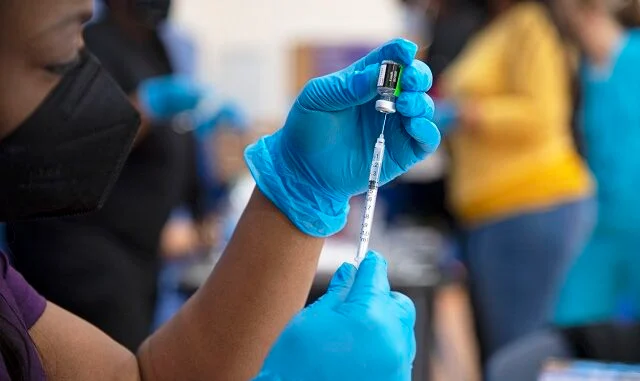
LPN Nicole Banks draws up a dose of COVID-19 vaccine during a “Be a Superhero, Get Vaxxed” themed vaccination event at Indian Creek Elementary School in Clarkston on Saturday, Feb. 5, 2022. Photo by Dean Hesse.
By Logan C. Ritchie
August is National Immunization Awareness Month, and community ambassadors in Clarkston have reason to celebrate. One year into a project to boost COVID-19 vaccine confidence in immigrant communities, vaccination rates are rising.
Data shows that 74.5% of Clarkston residents are partially vaccinated and 66.5% are fully vaccinated for COVID-19. That’s the highest vaccination rate in Georgia compared to other areas with the same Social Vulnerability Index (SVI), according to the Prevention Research Center at Georgia State University.
SVI uses U.S. Census data to determine the vulnerability of each census tract based on factors like socioeconomics, age, disability, minority status, language, housing, and transportation. Clarkston ranks in the top 8% in the U.S. according to GSU.
How’d the Clarkston vaccine rates jump, despite language barriers, mistrust of the medical community, and transportation issues?
GSU was awarded a grant to hire five community ambassadors who are highly visible in the community. They’re recruiting for vaccine events by creating relationships, communicating in multiple languages, and participating in community health fairs.
Ambassadors hail from the largest population groups – Burmese, Congolese, Middle Eastern, Afghan and Sudanese – to educate refugees and immigrants in Clarkston. Between them, the ambassadors speak 10 languages.
Selar Shwani is an ambassador who lives in Tucker. Her family fled Kurdistan during a conflict with Iran in 1997, landing in Turkey, Guam, and finally Clarkston. She understands the shock of adapting to a new community, language and societal norms.
Shwani is a medical interpreter with experience in early childhood education. When she started as an ambassador, she said Clarkston residents were resistant to learning about the COVID-19 vaccine.
“We are in the community every week at shopping plazas, going store to store, talking to owners, managers, shoppers about the vaccine,” she said. “They didn’t want anything to do with us. Slowly, slowly, people began trusting us. We invited people to every event, and [ambassadors] would be there whether it was an event sponsored by GSU or not.”
The day Shwani spoke to Tucker Observer, she was returning from taking a family to get vaccinated. After 16 months of the COVID-19 vaccine being available, ambassadors are still dealing with vaccine hesitancy due to misinformation. Messaging about the loss of fertility for women and virility for men stems from social media.
“We just listen and try to understand. It has not been an easy job, but it has paid off,” said Suad Ali, GSU graduate student in public health.
A refugee from Somalia, Ali graduated from GSU with a degree in journalism and later began working in refugee resettlement. Now a vaccine confidence and uptake research assistant, Ali builds partnerships nationally and locally to promote vaccines.
Ambassadors have offered cash rewards, held vaccine events at apartment complexes, and brought in a well-known pastor to increase interest. But what works for one community doesn’t work for another, Ali said.
One of the Prevention Research Center’s most successful interventions is engaging trusted institutions: schools. Ali created the superhero vaccine event at Indian Creek Elementary School that brought out hundreds of people. School-based events have distributed 1,400 vaccines.
“We can see the difference we made in the community,” said Ali.
Read the original story TuckerObserver.com.











